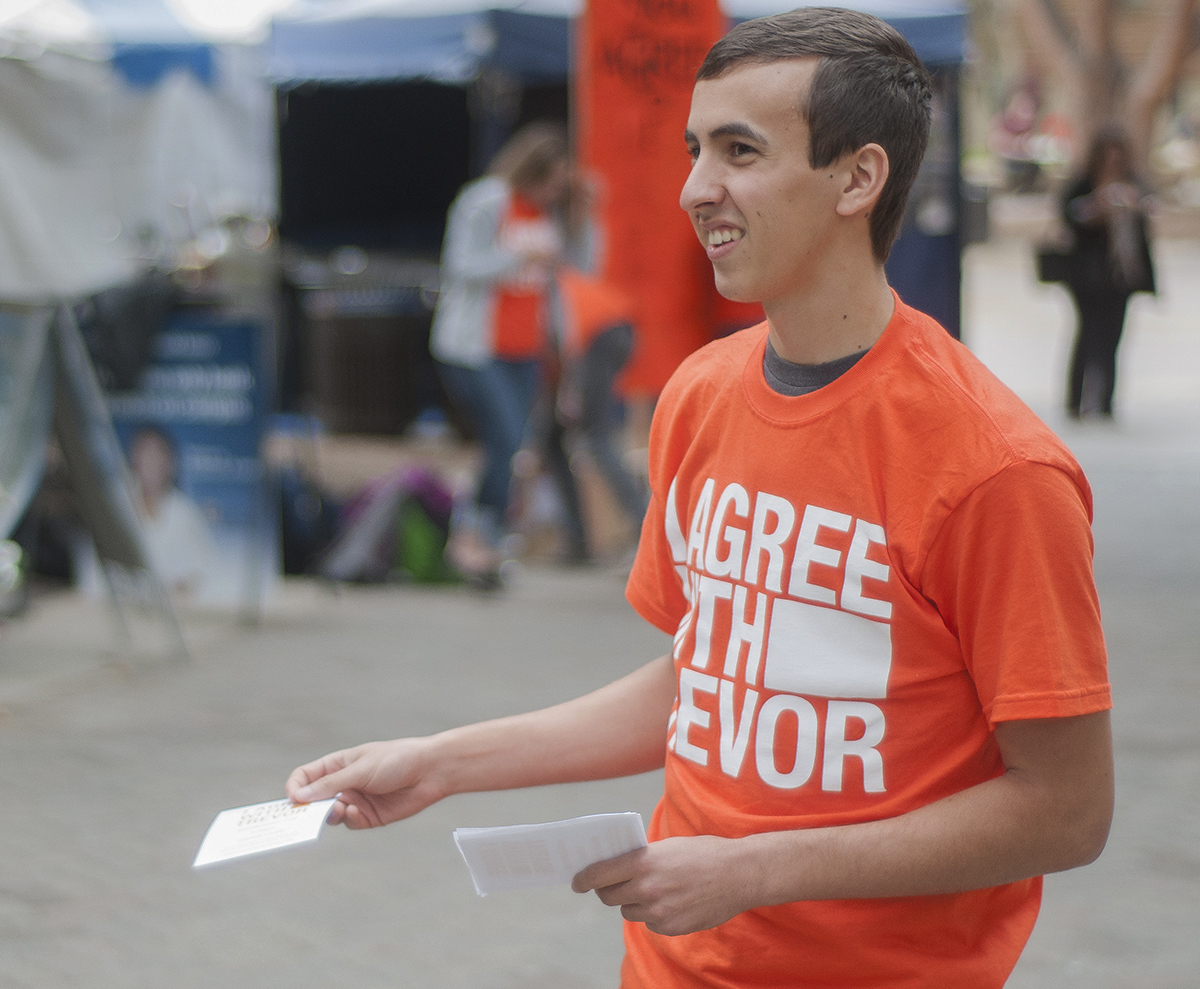Offering a look at the other side of flyering

(Daily Bruin file photo)
By Denise Lin
Nov. 20, 2015 12:00 a.m.
Walking down Bruin Walk can feel like navigating an obstacle course. The obstacles? All the people flyering who try to get you to buy something, check out a club or go to an event. But what drives these interactions? What determines if you do or don’t take a flyer? Daily Bruin Radio reporter Denise Lin takes to Bruin Walk to find out.
TRANSCRIPT:
PEOPLE FLYERING: Buy ice cream. A $1.50 ice cream. Donate to the homeless this winter, keep them warm!
LIN: Walking down Bruin Walk can feel like navigating an obstacle course. The obstacles? All the people flyering who try to get you to buy something, check out a club or go to an event.
PEOPLE FLYERING: Bake sale! I know you’re hungry!
LIN: Despite the efforts of those flyering, they are often met by a stream of unresponsive students. What is it like trying to catch all these people so intensely focused on ignoring you? I parked myself on Bruin Walk to find out.
Second-year neuroscience student Logan Kim was flyering for Mobile Clinic’s Sponsor a Home event. Flyering is hard for her sometimes.
KIM: It’s a little brutal. I just want them to take a flyer and help the homeless. Sometimes I say shocking things to get their attention, and sometimes I go to the middle of Bruin Walk and dance. It’s a harsh, harsh world out there.
LIN: Second-year history major Annie Davis was also flyering for Mobile Clinic.
LIN: Davis knows what it’s like to be on the other side of this.
DAVIS: I hate flyering with a passion, because I am that girl who puts on my full RBF, wears my sunglasses. I make myself look as intimidating as I can, I have my sunglasses on, my headphones in and I am just not willing to take flyers from anyone.
LIN: Sara Etchison, adjunct professor in the psychology department, teaches a course on human motivation and had some insight about why people like Davis react the way they do.
ETCHISON: There’s a norm in our relationships that if someone gives you something you give them something back. You try not to make eye contact because you feel like you may have to keep talking, so if you avoid the initial interaction, you can avoid all of the subsequent parts of it.
LIN: The fact that people are familiar with the flyering on Bruin Walk makes them even more guarded.
ETCHISON: On Bruin Walk, it’s such a known location. … You know exactly what’s happening and you don’t want to participate.
LIN: Dr. Etchison says that walking down Bruin Walk can be tiring.
ETCHISON: It’s emotionally taxing, it feels inconsistent to be a nice person who does in fact care about whatever organization. … I do care about education, I do care about children, I do care what’s happening internationally.
LIN: When I tried to interview people for the story, I realized how similar it is to flyering.
LIN: I’m writing a story about flyering for Daily Bruin, do you have a minute?
STUDENT 1: I’m sorry.
LIN: Hi excuse me, I’m doing a story on flyering on Bruin Walk, do you have a moment?”
STUDENT 2: No, I’m sorry.
LIN: Through some cold rejections, I gained some empathy for students who flyer. Maybe it’s good to just take that little piece of paper once in a while.
ETCHISON: You certainly make their life easier; it is pretty hard to hear no-no-no-no-no, all day long.
DAVIS: We annoy people. They annoy us. It goes both ways. I think that’s part of why it works. There are the people who are like, I get this. I understand what it’s like to flyer. It’s a funny process.
LIN: And maybe there are real benefits to both sides.
ETCHISON: They’ve done studies where they’ve had people commuting start conversations with somebody. And you usually avoid this – you try not to have those conversations. But they found that people’s moods were better when they had done it. So we kind of rob ourselves sometimes of the benefits of that sort of small talk that can be a little awkward but also makes us feel more connected even to strangers. There’s a real benefit to that type of interaction.
LIN: In the end, it’s just a piece of paper.
ETCHISON: In the end, it’s just a piece of paper.
For Daily Bruin Radio, this is Denise Lin.


